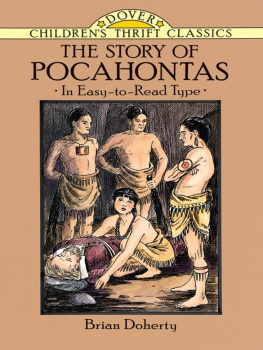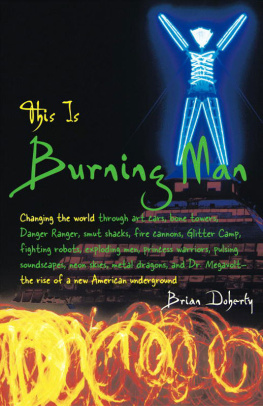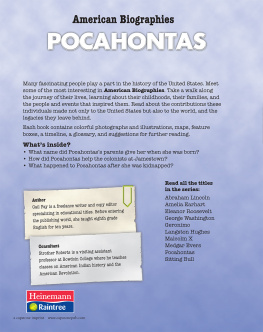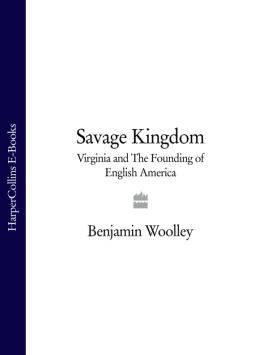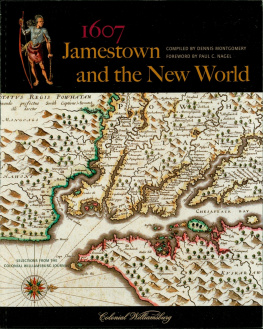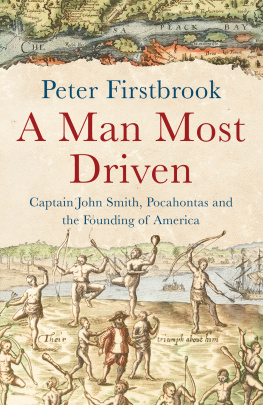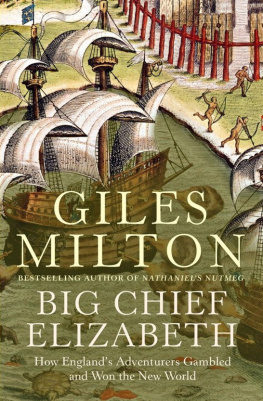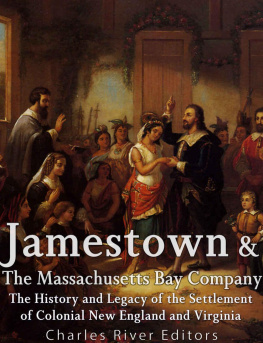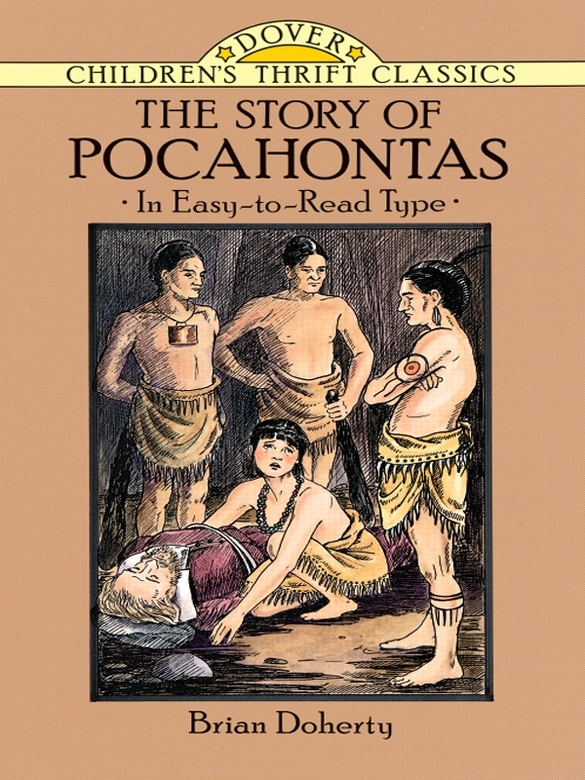Chapter 1
The English Arrive in Virginia
I N THE WINTER of 1606, three English ships, the Susan Constant, the Godspeed and the Discovery, started across the Atlantic under the command of Captain Christopher Newport. They carried 105 men, intending to settle at Roanoke Island, where an English colony had disappeared twenty years before, but they were driven further north by a storm. After many months at sea, they began hunting for a suitable place for settlement. They sailed into the broad opening of Chesapeake Bay and were still moving northward when they encountered a wide river that flowed into the bay from the mainland on the west. They turned the prows of their ships into this river, which they called the James, in honor of their king, and studied the shores for an inviting spot to land.
It was May, with mild skies and soft breezes that kept the craft sailing against the current. These men, standing on their decks, were sure they had never gazed upon anything so beautiful. The banks were filled with wild flowers, whose fragrance wafted across the smooth waters, while the hills and mountains in the distance were softened to delicate tints against the blue sky.
There were men and women in this land, descendants of those who had lived there for unknown ages. They were standing on the shore, watching the approaching vessels. One party, among whom several women could be seen, stood at least a hundred yards back from the stream as if afraid to come nearer. Another party gathered on the edge of the river, where there was a natural clearing of an acre or two. When the Susan Constant, which was a hundred yards ahead of the smaller boats, pulled up alongside this group, two of the warriors on the bank let their arrows fly.
The men on the decks smiled at these efforts. Captain Newport suggested they fire their guns into the party, as they had done days before when greeted with a shower of arrows.
No, we should cultivate their good will. We will need their friendship, and must not use our guns as long as our lives can be saved without them.
This remark was made by a man standing at the prow, spyglass in hand. He was of sturdy build, in well-to-do civilians clothing, with a full sandy beard and a huge mustache. His face was deeply tanned, he wore a sword at his side and his face was resolute and firm. He was not yet thirty years of age and no one could look at his figure without seeing he had unusual strength. Mentally and physically, he was stronger than the officers and crew around him. This man was Captain John Smith, whose great services later earned him the name Father of Virginia. He was one of the bravest of menunselfish, enterprising and far-seeing.
By the afternoon of the next day, the three vessels had already traveled eighty miles from the mouth of the James River. They were approaching a peninsula where they had decided to make camp, when everyones attention was turned upstream. Captain Smith lifted his telescope to his eyes. Around a bend in the river a canoe shot into sight.
Captain Newport, who also had a spyglass, stood near Smith and studied the small craft as well.
Those two warriors have more courage than their friends, Newport remarked.
There is only one warrior in the canoe, replied Smith, gazing through his telescope; the other is a woman, and
Here Smith hesitated, but Newport spent another minute studying the canoe and said, You are rightand the woman is not an old one.
She is not a woman, but a girl.
Seated in the middle of the canoe was an Indian youth who was less than twenty years old. Propelling the boat, he faced the vessels downriver. He had long, black hair that dangled about his shoulders, and his face was stained with the juice of the puccoon, or blood-root. His chest was bare but his waist was clasped with a deerskin girdle, a skirt falling below his knees, with leggings that reached to his neatly fitted beaded moccasins. He was finely formed, fleet-footed and a strong warrior despite his youth.
The other occupant of the little craft was the youths sister. She was no more than twelve years old, with features of almost classical beauty. She had thrown back her doeskin robe, lined with wood doves down. She wore coral bracelets on her wrists and ankles, and a white plume in her abundant hair.
Her leggings and skirt were similar to her brothers, but the upper part of her body was clothed in a close-fitting doeskin jacket that covered her arms to the elbow. Her face was not treated with the red juice that her brother used. This girl was a natural athlete who could speed through the woods like a deer, shoot an arrow with the accuracy of a veteran warrior, swim like a fish and read natures faint signs the way we might read a book.
Nantaquas, as the young man was called, and his sister, Pocahontas, had left their home a long way up the river, paddling downstream, perhaps to call on some friends, when, rounding a bend in the river, they were startled by the sight of the three ships slowly coming up the river with their white sails spread. Nantaquas stopped paddling for a moment while both gazed at the sight. They had heard stories told by the tribes to the south of a people who lived far beyond the sea, with canoes like giant birds that were able to sail through storms in safety.
When Pocahontas had looked for several minutes in silent amazement at the European ships, watching the men on the decks, she asked:
Why are they coming to the country of Powhatan?
I dont know, her brother replied, maybe they intend to take away our hunting grounds.
How can that be, the girl laughed, when the warriors of Powhatan are like the leaves on the trees? There are only a handful of the white folkwe have nothing to fear from them. Lets visit the big canoes.
The youth increased the speed of his boat, drawing rapidly near the Susan Constant, whose passengers and crew watched his approach with keen curiosity. Nantaquas sped on downstream, however, doubting the wisdom of carrying out his sisters wishes. She believed that any people who were treated kindly would give the same treatment to those that were good to them.
But Nantaquas recalled that the stories of the white men he had heard were not to their credit. Some of them had slain Indians as though they were wild animals; they had treated them with great cruelty and repaid kindness with brutality. The tribes along the coasts further south told of the Spanish explorers who came looking for gold and a Fountain of Youth, bringing with them sickness and war. Many Indians had been killed or taken from their homelands as slaves. Closer to the land of Powhatan there had been other Englishmen, too. But their settlement on Roanoke Island and all the white people there had mysteriously disappeared almost twenty years ago, before Nantaquas was born. Whether they were killed by the Indians, or whether they had joined the friendly tribes who perhaps rescued them from starvation, Nantaquas was not sure. He realized, however, that too little was known about these new arrivals. They might be friendly, but they might just as likely try to carry off his sister or him as prisoners, or demand a high price for their ransom.
Nantaquas checked his boat a hundred yards from the largest vessel. Smith and the other passengers were at the rail of the Susan Constant , looking down at the visitors who hesitated to draw nearer.
Welcome! Welcome! Smith called out, Wont you come aboard that we may shake hands and break bread with you?
Although Nantaquas and his sister did not understand the words, the gestures of the men were clear.

